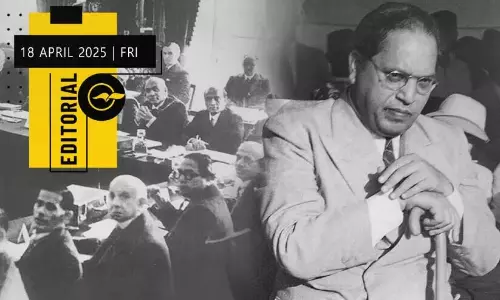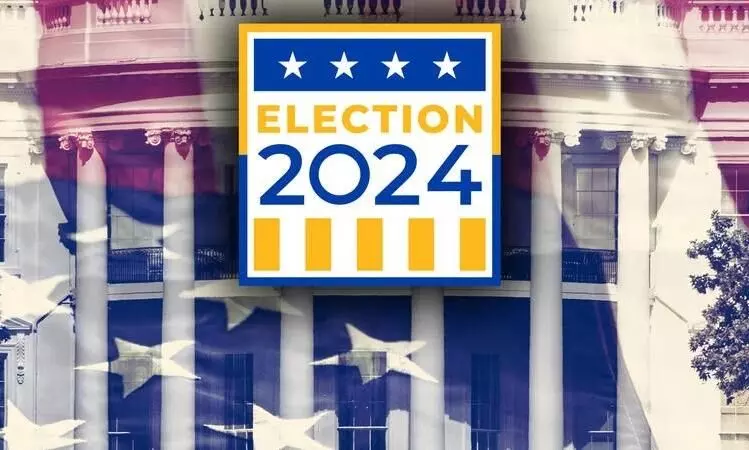
Strengthening the democratic process
text_fieldsMax Boot, a former editor of the New York Times, published an article in the Washington Post entitled “Lessons from the French and British Elections for Strengthening American Democracy.” According to him, there was nothing surprising in the results of the British general election. As expected, the Labour Party won an overwhelming majority, obtaining 412 seats compared to 121 seats for the Conservative Party. It is noteworthy that many prominent Conservative candidates lost their seats to Labour and Reform Parties, and to Independents. This reflected the opinion polls conducted before the vote. Hence, everybody expected a comprehensive change in the British political scene. People were intolerant of the high cost of living they experienced under the Conservative government. Rishi Sunak’s handling of the war in Ukraine and Gaza disappointed the people.
Now, the 14-year rule of the Conservatives has ended, and the Labour Party, for the first time since 2010, has come back to power. The new Prime Minister, Keir Starmer, has promised that he would “rebuild” and “unite” the country. Starmer, according to political observers, is more pragmatic. After Jeremy Corbyn took over the leadership of the Labour Party, he slowly shifted the party from the far-left line to a more centrist one. This shift was purposefully done to make it more electable to the voters of the UK. Starmer has been describing his party as the “Changed Labour Party,” which others used to mock as the “Purged Labour Party.” Anyway, it could almost double its number of parliamentary seats by capitalizing on the discontentment of the people against the Conservative government. To win Tory votes, it is noted that the Labour Party ditched most of its left-wing policies. It promised restrictions on public spending and campaigned on traditional patriotic themes. The new British politics, as well as elsewhere, is dominated by stern realism and right-wing fantasies! Its stance on humanitarian issues is often ambiguous. Moral arguments do not stand in the way of political victory!
Different reasons were pointed out by analysts for the plight of Rishi Sunak. Despite his promise, he could not control immigration; people were arriving on small boats from France. The waiting lists for the National Health Service increased. Economic growth was stagnant, though inflation slightly decreased. But above all, Sunak could not connect with voters. British youth, especially on the university campuses, protested against the genocide taking place in Gaza. The Prime Minister overreacted and argued that “mob rule is replacing democratic rule.” This exacerbated the resentment of Muslims and other minorities. Actually, the youth, the new generation in Europe, are anti-fascist and peace-loving. Only the political leaders, as we witnessed in India, are pro-fascist, that too for their personal gains. Keir Starmer, the opposition leader, was also accused of taking the same stance as Rishi Sunak. But after intense public pressure, he called for a ceasefire in Gaza. He was criticized for denying tickets to some pro-Palestinian members of the Labour Party. It has to be noted that at least five pro-Palestinian candidates, including Jeremy Corbyn, won the election as independents.
The result of the French legislative elections was another shock to the right-wing politicians in Europe. After coming first in the first round of voting, the far-right National Rally party fell to third place, behind the leftist New Popular Front and President Emmanuel Macron’s coalition, with no party securing an absolute majority in the National Assembly. According to observers, France is facing a situation of political paralysis. Anyway, it is obviously better than the right-wing alternative led by Marine Le Pen. After leading the first round of voting, the National Rally party was closer to the gates of power than ever before and was on the cusp of forming France’s first far-right government. But after a week of political bargaining, more than 200 left-wing and centrist candidates withdrew from the second round in a bid to avoid splitting the vote. The New Popular Front (NFP), a cluster of several parties from the extreme left to the more moderate, emerged with the most seats in the decisive second round. Did the NFP win the French election? Not quite. The NFP won 182 seats in the National Assembly, making it the largest group in the 577-seat parliament. Macron’s centrist Ensemble alliance, which trailed in a distant third in the first round, made a strong recovery to win 163 seats. The National Rally (RN) party and its allies, despite leading the first round, won 143 seats. Though France now has a hung parliament, it is indeed observed as a victory for the mainstream parties as they could unite to prevent the extreme right from taking office.
As Max Boot pointed out in the Washington Post, there are lessons to be learned from the British and French election results. The most important factor is that the moderate people, even the left and the right, worked together to thwart the extremists from power. Hence, we learn that the electorate has to lend their ears to the moderate and competent as a political alternative to populism. The widening income inequality, problems of migration, the impact of inflation, etc., are worldwide phenomena to be sorted out and solved. But ethnic violence, religious extremism, or xenophobia can’t be an alternative to the democratic experience. As the philosopher Jason Stanley points out, fascists often submit to larger-than-life leaders who think they are solely capable of running the world. They twist the core understanding of reality by sheer propaganda and promote anti-intellectualism. They attack educational systems and universities that challenge their ideas. Anyway, let us hope that this reprieve may help extend and strengthen the democratic process.























